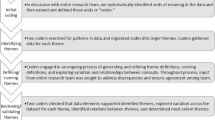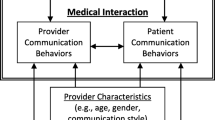Abstract
OBJECTIVE: Patients’ self-management practices have substantial consequences on morbidity and mortality in diabetes. While the quality of patient-physician relations has been associated with improved health outcomes and functional status, little is known about the impact of different patient-physician interaction styles on patients’ diabetes self-management. This study assessed the influence of patients’ evaluation of their physicians’ participatory decision-making style, rating of physician communication, and reported understanding of diabetes self-care on their self-reported diabetes management.
DESIGN: We surveyed 2,000 patients receiving diabetes care across 25 Veterans’ Affairs facilities. We measured patients’ evaluation of provider participatory decision making with a 4-item scale (Provider Participatory Decision-making Style [PDMstyle]; α=0.96), rating of providers’ communication with a 5-item scale (Provider Communication [PCOM]; α=0.93), understanding of diabetes self-care with an 8-item scale (α=0.90), and patients’ completion of diabetes self-care activities (self-management) in 5 domains (α=0.68). Using multivariable linear regression, we examined self-management with the independent associations of PDMstyle, PCOM, and Understanding.
RESULTS: Sixty-six percent of the sample completed the surveys (N=1,314). Higher ratings in PDMstyle and PCOM were each associated with higher self-management assessments (P<.01 in all models). When modeled together, PCOM remained a significant independent predictor of self-management (standardized β: 0.18; P<.001), but PDMstyle became nonsignificant. Adding Understanding to the model diminished the unique effect of PCOM in predicting self-management (standardized β: 0.10; P=.004). Understanding was strongly and independently associated with self-management (standardized β: 0.25; P<.001).
CONCLUSION: For these patients, ratings of providers’ communication effectiveness were more important than a participatory decision-making style in predicting diabetes self-management. Reported understanding of self-care behaviors was highly predictive of and attenuated the effect of both PDMstyle and PCOM on self-management, raising the possibility that both provider styles enhance self-management through increased patient understanding or self-confidence.
Similar content being viewed by others
References
Glasgow RE, Wagner EH, Kaplan RM, Vinicor F, Smith L, Norman J. If diabetes is a public health problem, why not treat it as one? A population-based approach to chronic illness. Ann Behav Med. 1999;21:159–70.
Etzwiler DD. Chronic care: a need in search of a system. Diabetes Educ. 1997;23:569–73.
Wagner EH, Austin BT, Von Korff M. Organizing care for patients with chronic illness. Milbank Q. 1996;74:511–44.
The Diabetes Control and Complications Trial/Epidemiology of Diabetes Interventions and Complications Research Group. Retinopathy and nephropathy in patients with type 1 diabetes four years after a trial of intensive therapy. N Engl J Med. 2000;342:381–9.
UK Prospective Diabetes Study Group. Tight blood pressure control and risk of macrovascular and microvascular complications in type 2 diabetes: UKPDS 38. BMJ. 1998;317:703–13.
UK Prospective Diabetes Study (UKPDS) Group. Effect of intensive blood-glucose control with metformin on complications in overweight patients with type 2 diabetes (UKPDS 34). Lancet. 1998;352:854–65.
United Kingdom Prospective Diabetes Study (UKPDS). Relative efficacy of randomly allocated diet, sulphonylurea, insulin, or metformin in patients with newly diagnosed non-insulin dependent diabetes followed for three years. BMJ. 1995;310:83–8.
Pyroala K, Pedersen TR, Kjekshus J, Faergeman O, Olsson AG, Thorgeirsson G. Cholesterol lowering with simvastatin improves prognosis of diabetic patients with coronary heart disease. A subgroup analysis of the Scandinavian Simvastatin Survival Study (4S). Diabetes Care. 1997;20:614–20.
Harris MI. Health care and health status and outcomes for patients with type 2 diabetes. Diabetes Care. 2000;23:754–8.
Glasgow RE, Hampson SE, Strycker LA, Ruggiero L. Personal-model beliefs and social-environmental barriers related to diabetes self-management. Diabetes Care. 1997;20:556–61.
Lorenz RA, Bubb J, Davis D, et al. Changing behavior. Practical lessons from the diabetes control and complications trial. Diabetes Care. 1996;19:648–52.
Glasgow RE, Strycker LA. Preventive care practices for diabetes management in two primary care samples. Am J Prev Med. 2000;19:9–14.
Hunt LM, Pugh J, Valenzuela M. How patients adapt diabetes self-care recommendations in everyday life. J Fam Pract. 1998;46:207–15.
McNabb WL. Adherence in diabetes: can we define it and can we measure it? Diabetes Care. 1997;20:215–8.
Lutfey KE, Wishner WJ. Beyond “compliance” is “adherence”. Improving the prospect of diabetes care. Diabetes Care. 1999;22:635–9.
Kravitz RL, Hays RD, Sherbourne CD, et al. Recall of recommendations and adherence to advice among patients with chronic medical conditions. Arch Intern Med. 1993;153:1869–78.
Rosenstock IM. Enhancing patient compliance with health recommendations. J Pediatr Health Care. 1988;2:67–72.
Anderson RM, Funnell MM. Compliance and adherence are dysfunctional concepts in diabetes care. Diabetes Educ. 2000;26:597–604.
Von Korff M, Gruman J, Schaefer J, Curry SJ, Wagner EH. Collaborative management of chronic illness. Ann Intern Med. 1997;127:1097–102.
Clark NM, Gong M. Management of chronic disease by practitioners and patients: are we teaching the wrong things? BMJ. 2000;320:572–5.
Holman H, Lorig K. Patients as partners in managing chronic disease. Partnership is a prerequisite for effective and efficient health care. BMJ. 2000;320:526–7.
Lorig KR, Sobel DS, Stewart AL, et al. Evidence suggesting that a chronic disease self-management program can improve health status while reducing hospitalization: a randomized trial. Med Care. 1999;37:5–14.
Laine C, Davidoff F. Patient-centered medicine. A professional evolution. JAMA. 1996;275:152–6.
Glasgow RE, Anderson RM. In diabetes care, moving from compliance to adherence is not enough. Something entirely different is needed. Diabetes Care. 1999;22:2090–2.
Laine C, Caro JF. Preventing complications in diabetes mellitus: the role of the primary care physician. Med Clin North Am. 1996;80:457–74.
DiMatteo MR. The physician-patient relationship: effects on the quality of health care. Clin Obstet Gynecol. 1994;37:149–61.
Greenfield S, Kaplan S, Ware JE Jr. Expanding patient involvement in care. Effects on patient outcomes. Ann Intern Med. 1985;102:520–8.
Sherbourne CD, Hays RD, Ordway L, DiMatteo MR, Kravitz RL. Antecedents of adherence to medical recommendations: results from the Medical Outcomes Study. J Behav Med. 1992;15:447–68.
Kaplan SH, Greenfield S, Ware JE Jr. Assessing the effects of physician-patient interactions on the outcomes of chronic disease. Med Care. 1989;27(3 Suppl):110S-127S.
Stewart MA. Effective physician-patient communication and health outcomes: a review. CMAJ. 1995;152:1423–33.
Williams GC, Freedman ZR, Deci EL. Supporting autonomy to motivate patients with diabetes for glucose control. Diabetes Care. 1998;21:1644–51.
Anderson RM, Funnell MM, Butler PM, Arnold MS, Fitzgerald JT, Feste CC. Patient empowerment. Results of a randomized controlled trial. Diabetes Care. 1995;18:943–9.
Greenfield S, Kaplan SH, Ware JE Jr, Yano EM, Frank HJ. Patients’ participation in medical care: effects on blood sugar control and quality of life in diabetes. J Gen Intern Med. 1988;3:448–57.
Clark NM, Janz NK, Dodge JA, et al. Changes in functional health status of older women with heart disease: evaluation of a program based on self-regulation. J Gerontol B Psychol Sci Soc Sci. 2000;55:117S-26S.
Hays RD, Kravitz RL, Mazel RM, et al. The impact of patient adherence on health outcomes for patients with chronic disease in the Medical Outcomes Study. J Behav Med. 1994;17:347–60.
Clark NM, Dodge JA. Exploring self-efficacy as a predictor of disease management. Health Educ Behav. 1999;26:72–89.
Berger M, Muhlhause I. Diabetes care and patient-oriented outcomes. JAMA. 1999;281:1676–8.
Olivarius N, Beck-Neilson H, Andreasen AH, Hoder M, Pedersen PA. Randomized controlled trial of structured personal care of type 2 diabetes mellitus. BMJ. 2001;323:1–9.
Golin CE, DiMatteo MR, Gelberg L. The role of patient participation in the doctor visit. Implications for adherence to diabetes care. Diabetes Care. 1996;19:1153–64.
Senecal C, Nouwen A, White D. Motivation and dietary self-care in adults with diabetes: are self-efficacy and autonomous self-regulation complementary or competing constructs? Health Psychol. 2000;19:452–7.
Kaplan SH, Greenfield S, Gandek B, Rogers WH, Ware JE Jr. Characteristics of physicians with participatory decision-making styles. Ann Intern Med. 1996;124:497–504.
Cooper-Patrick L, Gallo JJ, Gonzales JJ, et al. Race, gender, and partnership in the patient-physician relationship. JAMA. 1999;282:583–9.
DiMatteo MR. The role of the physician in the emerging health care environment. West J Med. 1998;168:328–33.
Wolpert HA, Anderson BJ. Management of diabetes: are doctors framing the benefits from the wrong perspective? BMJ. 2001;323:994–6.
Pogach LM, Hawley G, Weinstock R, et al. Diabetes prevalence and hospital and pharmacy use in the Veterans Health Administration (1994). Use of an ambulatory care pharmacy-derived database. Diabetes Care. 1998;21:368–73.
Boyko EJ, Koepsell TD, Gaziano JM, Horner RD, Feussner JR. US Department of Veterans affairs medical care system as a resource to epidemiologists. Am J Epidemiol. 2000;151:307–14.
Krein SL, Hayward RA, Pogach L, BootsMiller BJ. Department of Veterans Affairs’ quality enhancement research initiative for diabetes mellitus. Med Care. 2000;38(6 Suppl 1):138S-148S.
Goodall TA, Halford WK. Self-management of diabetes mellitus: a critical review. Health Psychol. 1991;10:1–8.
Clement S. Diabetes self-management education. Diabetes Care. 1995;18:1204–14.
Kaplan SH, Gandek B, Greenfield S, Rogers W, Ware JE. Patient and visit characteristics related to physicians’ participatory decision-making style. Results from the Medical Outcomes Study. Med Care. 1995;33:1176–87.
Hayward RA, Manning WG, Kaplan SH, Wagner EH, Greenfield S. Starting insulin therapy in patients with type 2 diabetes: effectiveness, complications, and resource utilization. JAMA. 1997;278:1663–9.
Gorsuch RL. Factor Analysis, 2nd Ed. Hillsdale, NJ: Lawrence Erlbaum Associates; 1983.
Wagner EH, Glasgow RE, Davis C, et al. Quality improvement in chronic illness care: a collaborative approach. Jt Comm J Qual Improv. 2001;27:63–80.
Beisecker AE, Beisecker TD. Patient information-seeking behaviors when communicating with doctors. Med Care. 1990;28:19–28.
Deber RB, Kraetschmer N, Irvine J. What role do patients wish to play in treatment decision making? Arch Intern Med. 1996;156:1414–20.
Strull WM, Lo B, Charles G. Do patients want to participate in medical decision making? JAMA. 1984;252:2990–4.
Waitzkin H, Stoeckle JD. The communication of information about illness. Clinical, sociological, and methodological considerations. Adv Psychosom Med. 1972;8:180–215.
Mansell D, Poses RM, Kazis L, Duefield CA. Clinical factors that influence patients’ desire for participation in decisions about illness. Arch Intern Med. 2000;160:2991–6.
DiMatteo MR, Sherbourne CD, Hays RD, et al. Physicians’ characteristics influence patients’ adherence to medical treatment: results from the Medical Outcomes Study. Health Psychol. 1993;12:93–102.
Williams GC, Grow VM, Freedman ZR, Ryan RM, Deci EL. Motivational predictors of weight loss and weight-loss maintenance. J Pers Soc Psychol. 1996;70:115–26.
Wagner EH. The role of patient care teams in chronic disease management. BMJ. 2000;320:569–72.
Glasgow RE. A practical model of diabetes management and education. Diabetes Care. 1995;18:117–26.
Author information
Authors and Affiliations
Corresponding author
Additional information
This work was supported by The Department of Veterans Affairs Office of Quality and Performance, the VA Health Services Research and Development Program (Grant DIS-99221-1), and The Robert Wood Johnson Foundation. Dr. Kerr is a VA HSR&D Career Development Awardee.
The views expressed herein do not necessarily represent those of The Robert Wood Johnson Foundation or The Department of Veterans Affairs.
Rights and permissions
About this article
Cite this article
Heisler, M., Bouknight, R.R., Hayward, R.A. et al. The relative importance of physician communication, participatory decision making, and patient understanding in diabetes self-management. J GEN INTERN MED 17, 243–252 (2002). https://doi.org/10.1046/j.1525-1497.2002.10905.x
Issue Date:
DOI: https://doi.org/10.1046/j.1525-1497.2002.10905.x




